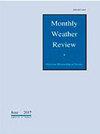利用 NSSL 的相控阵雷达观测数据,在实验性 1 千米预报预警系统中测试随机和扰动参数方法
IF 3
3区 地球科学
Q3 METEOROLOGY & ATMOSPHERIC SCIENCES
引用次数: 0
摘要
美国国家强风暴实验室(NSSL)的试验性预报预警系统(WoFS)之所以能够成功地为恶劣和危险天气提供有用的概率指导,主要归功于对观测数据,特别是雷达观测数据的频繁同化。相控阵雷达(PAR)技术是取代当前美国业务雷达网络的潜在候选技术,通过每隔约 1 分钟对大气层进行全容积扫描,可以更快速地同化雷达观测数据。根据以往的研究,更频繁的 PAR 数据同化可以改善预报,但也可能导致集合分散不足和观测同化不理想。使用随机和扰动参数方法来增加集合扩散是解决这一问题的潜在办法。在这项研究中,使用 1 公里尺度的 WoFS 版本评估了四种随机和扰动参数方法,包括随机动能反向散射(SKEB)方案、基于物理的随机扰动(PSP)方案、固定扰动参数(FPP)方法和新型地表-模式方案混合(SMSB)方法。利用 2016 年 5 月 9 日龙卷风爆发时的 NSSL PAR 观测数据进行了实验,以评估这些方法单独、不同组合和不同循环间隔的影响。这些实验结果揭示了随机和扰动参数方法对未来版本 WoFS 的潜在好处。随机参数法和扰动参数法可以在风暴发展期做出更准确的预报。此外,与使用单一方法相比,将多种方法结合使用可获得更高水平的预报。本文章由计算机程序翻译,如有差异,请以英文原文为准。
Testing stochastic and perturbed parameter methods in an experimental 1-km Warn-on-Forecast system using NSSL’s phased-array radar observations
The success of the National Severe Storms Laboratory’s (NSSL) experimental Warn-on-Forecast System (WoFS) to provide useful probabilistic guidance of severe and hazardous weather is mostly due to the frequent assimilation of observations, especially radar observations. Phased-array radar (PAR) technology, which is a potential candidate to replace the current U.S. operational radar network, would allow for even more rapid assimilation of radar observations by providing full-volumetric scans of the atmosphere every ~1 min. Based on previous studies, more frequent PAR data assimilation can lead to improved forecasts, but it can also lead to ensemble underdispersion and suboptimal observation assimilation. The use of stochastic and perturbed parameter methods to increase ensemble spread is a potential solution to this problem. In this study, four stochastic and perturbed parameter methods are assessed using a 1-km-scale version of the WoFS and include the stochastic kinetic energy backscatter (SKEB) scheme, the physically-based stochastic perturbation (PSP) scheme, a fixed perturbed parameters (FPP) method, and a novel surface-model scheme blending (SMSB) method. Using NSSL PAR observations from the 9 May 2016 tornado outbreak, experiments are conducted to assess the impact of the methods individually, in different combinations, and with different cycling intervals. The results from these experiments reveal the potential benefits of stochastic and perturbed parameter methods for future versions of the WoFS. Stochastic and perturbed parameter methods can lead to more skillful forecasts during periods of storm development. Moreover, a combination of multiple methods can result in more skillful forecasts than using a single method.
求助全文
通过发布文献求助,成功后即可免费获取论文全文。
去求助
来源期刊

Monthly Weather Review
地学-气象与大气科学
CiteScore
6.40
自引率
12.50%
发文量
186
审稿时长
3-6 weeks
期刊介绍:
Monthly Weather Review (MWR) (ISSN: 0027-0644; eISSN: 1520-0493) publishes research relevant to the analysis and prediction of observed atmospheric circulations and physics, including technique development, data assimilation, model validation, and relevant case studies. This research includes numerical and data assimilation techniques that apply to the atmosphere and/or ocean environments. MWR also addresses phenomena having seasonal and subseasonal time scales.
 求助内容:
求助内容: 应助结果提醒方式:
应助结果提醒方式:


